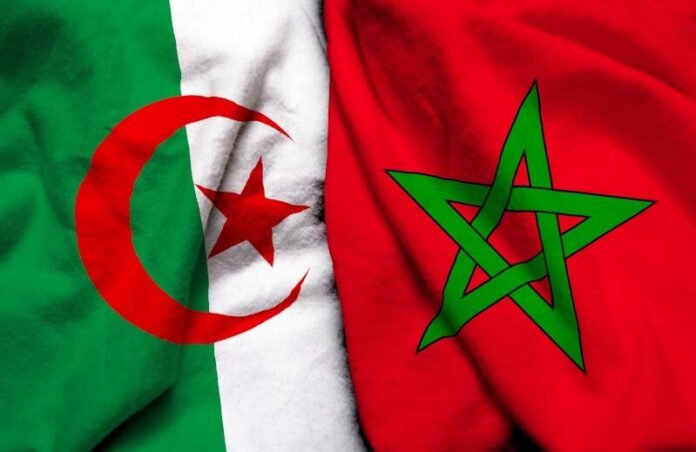Recently Morocco tightened controls on its border with Algeria. It strengthened border surveillance and took security measures including the deployment of forward posts with electronic and optical movement detection systems, high-sensitivity seismic sensors, fixed and mobile radars and observation drones. This development comes in the wake of Donald Trump’s return as the president of the United States. The border between Algeria and Morocco has been closed for 25 years but it is witnessing tensions again.
The decades-old rivalry between the North African neighbours ranges from territorial disputes to divergent political positions over regional issues. However, the conflict is showing no signs of thaw. Further, the regional rivalry has resulted in an indirect involvement of extra-regional power, becoming a subset of wider global rivalries.
Background of the Rivalry
Algeria and Morocco share historical and cultural ties. The two have the same Berber cultural and linguistic heritage. Both countries underwent Islamisation and Arabisation in the seventh century. After the 19th century, France dominated both countries. The friction between the neighbours began during this period. France ruled Algeria since the mid-19th century, while Morocco became a French protectorate in 1912. The border between the two countries was not marked properly.
The friction between Morocco and Algeria began during the French domination over the region in the colonial period. France ruled Algeria since the mid-19th century, while Morocco became a French protectorate in 1912. The border between the two countries was not marked, which became a friction point
The tension between the two countries started in 1903. The French authorities in Algeria started expanding the Algerian territory to the west claiming Béchar and Tindouf that Morocco claimed as parts of its own territory. This issue remained unresolved even as the two countries gained independence from France – Morocco in 1956 and Algeria in 1962.
Matters came to a head when despite demands from Morocco, Algeria refused to hand over the Béchar and Tindouf to Morocco. It resulted in the neighbours engaging in a brief war in 1963, which is known as the Sand War. The war ended with Morocco agreeing to enter into negotiations with Algeria. However, peace talks remained inconclusive.
Further, Western Sahara remained a cause of friction. Located in northwestern Africa, Western Sahara is bordered by Morocco in the north, Algeria in the northeast, Mauritania in the east and south and the Atlantic Ocean in the west and northwest. Western Sahara is categorised as a Non-Self Governing Territory by the United Nations. Spain controlled Western Sahara between 1884 and 1975. The dispute began in 1975 after Spain relinquished control over Western Sahara. Morocco claims it as its integral part but the Sahrawis, residents of Western Sahara, reject Morocco’s claim. The Sahrawis have also formed an organisation named Polisario Front, which is fighting for Western Sahara’s independence. Algeria supports the Polisario Front financially and militarily. This becomes an additional cause of friction between the two countries.
Wider impact of the Algeria-Moroccan Rivalry
The Algeria-Morocco conflict may be territorially restricted to North Africa, but it always cast its shadow over regional affairs. Also, the conflict has come to reflect wider global rivalries from time to time. This phenomenon is evident even in the present times.
The Algeria-Morocco dispute has often played out in the African Union. While Morocco has tried to oust the Sahrawi Arab Democratic Republic from the membership of the African Union (AU), Algeria has tried to raise this issue at the AU’s Peace and Security Council. The two rivals have also locked horns over the position of the chair of the AU in 2023. In April this year, Algeria along with Tunisia and Libya announced the formation of a new Maghreb Union, excluding Morocco, at a summit at Carthage in Tunisia. This step is intended to undermine the Arab Maghreb Union of which Morocco is a member.
Morocco forged a close partnership with the United States, allowing US forces access to Moroccan air bases. Morocco is designated as a major non-NATO ally. Also, Morocco is engaged in a military modernisation programme called Vision 2030 to become interoperable with the US and NATO
While the intense rivalry between Algeria and Morocco may have been for gaining greater regional influence, regional and extra-regional powers have put their stakes in this rivalry to serve their own economic and strategic interests.
In this quest, Western Sahara has been a convenient mechanism for various powers to get involved in the North African geopolitics. Morocco, a close partner of the United States, has emerged as a favoured partner for other Western countries as well. After its independence from France, Morocco forged a close partnership with the US, even allowing the US forces’ overflight and access to Moroccan air bases. Morocco is designated as a major non-NATO ally. Morocco is also engaged in a military modernisation programme called Vision 2030 to become interoperable with the US and NATO.
In 2020, the US recognised Morocco’s claim over Western Sahara in return for Morocco establishing diplomatic ties with Israel under the Abraham Accords. In 2022, Spain followed suit and supported Morocco’s position on the former Spanish colony. In October, French President Emmanuel Macron visited Rabat and endorsed Morocco’s stand on Western Sahara.
For the US, Morocco is a strategic partner. For Spain, engagements with Morocco matter for stemming the flow of illegal immigrants from Morocco to Spain. For France, Morocco is a bigger economic partner than Algeria. Hence the preference for Morocco on the part of the West.
Besides, to counter Morocco’s influence, Algeria has been a partner of Russia and Iran, both adversaries of the West. Strategic cooperation has been the base of Algeria’s ties with Russia. Algeria has been a major importer of Russian military equipment. In 2001, Algeria and Russia signed the Strategic Partnership Agreement. In 2023, the two countries upgraded this agreement to Enhanced Strategic Partnership, which expanded bilateral cooperation beyond military ties. Following the outbreak of the Russia-Ukraine war in 2022, despite pressure from Western countries, Algeria continued its close ties with Russia. Algeria is also expected to be the first buyer of Russia’s Su-27E stealth fighter jets.
Algeria has been a partner of Russia and Iran, both adversaries of the West. Strategic cooperation has been the base of Algeria’s ties with Russia. Algeria has been a major importer of Russian military equipment. Algeria is stepping up its engagements with Iran. Both exchanged several high-level visits last year
Apart from the rivalry between the West and Russia, the conflict between Israel and Iran is also reflected in the Algeria-Morocco relations. As a part of the normalisation process with Israel, Morocco is set to host an Israeli drone production facility. For its part, Algeria is stepping up its engagements with Iran. Last year, there have been several high-level visits between Algiers and Tehran. Both are expanding their cooperation in the areas of energy, tourism and economic partnership.
Algeria and Morocco are two major powers in North Africa that have been rivals for decades. Despite a shared anti-colonial past, the two powers have transitioned to divergent paths after their respective independence from France. Their rivalry continues to impact North Africa’s geopolitics as well as play its part in the ongoing global conflict.
–The writer is an Independent Political Analyst and Researcher based in Vadodara. Follow him on Twitter: @NiranjanMarjani. The views expressed are of the writer and do not necessarily reflect the views of Raksha Anirveda






